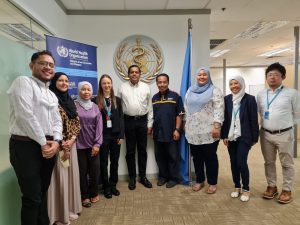
Malaysia is confronting the challenges of an aging population, with approximately 3.5 million individuals, constituting 7% of the populace, aged 65 or above. This demographic is anticipated to rise to 14% by 2030, presenting a pressing concern for the country. A significant proportion of older citizens grapple with one or more non-communicable diseases, such as diabetes, cardiovascular ailments, or mental health conditions. The progression of these illnesses often impedes their ability to partake in daily activities, encompassing work, driving, social interactions, hobbies, and self-care routines.
Recognizing the gravity of this issue, both Malaysia and the World Health Organization (WHO) have expressed deep concern. In a collaborative effort to address and mitigate these challenges, WHO has bestowed a grant of USD 10,000 upon a dedicated team from the Occupational Therapy Department within the Faculty of Health Sciences. The team comprises esteemed professionals, including Project Leaders Associate Prof. Dr. Akehsan Dahlan and Dr. Syamsul Anwar Sultan Ibrahim, alongside team members Dr. Harnisha binti Haidhir and YM Tengku Mohd Asri bin Tengku Makhtar from the Ministry of Health Malaysia and The Head of the Occupational Therapy Profession in Malaysia is Ms. Nora Hamid
The primary objective of this initiative is the development of a home-based program titled “My Home Occupational Engagement Activities” (MyHOME). This program aims to combat the deterioration of health conditions among older individuals by instilling meaningful occupational engagement activities, to be undertaken in collaboration with their caregivers. Rooted in health promotion and lifestyle modification principles, MyHOME endeavors to empower older adults, facilitating the continuation of daily activities crucial to their well-being and independence.
Crucially, the MyHOME program adopts an evidence-based and person-centered approach, tailored to maintain and enhance both physical and cognitive capacities. The program contemplates a variety of formats, incorporating group sessions held in clinics or communities, as well as individualized sessions. This versatility ensures accessibility and effectiveness across diverse contexts, addressing the unique needs of older individuals.
The overarching goal of this project is threefold: to develop a comprehensive occupational engagement activities program for the elderly, to conduct a training-of-trainers program for occupational therapists, and to undertake a rigorous evaluation of the MyHOME program. By seamlessly integrating these components, the initiative aspires to not only address the immediate health challenges faced by older Malaysians but also to establish sustainable solutions that resonate with the evolving landscape of elderly care. Through this collaborative endeavor, Malaysia endeavors to pave the way for a healthier and more engaged aging population, fostering independence and well-being among its senior citizens.
